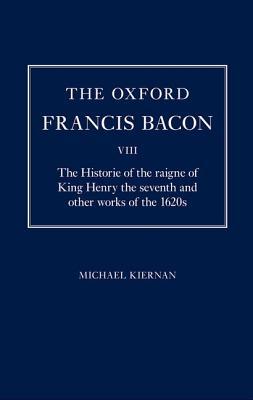The Oxford Francis Bacon VIII: The Historie of the Raigne of King Henry the Seventh and Other Works of the 1620s
by Francis Bacon
This volume belongs to the critical edition of the complete works of Francis Bacon (1561-1626), an edition that presents the works in broadly chronological order and in accordance with the principles of modern textual scholarship. This volume contains critical editions of five varied works Bacon composed during the 1620s. The most significant and substantial of these five works is his biography of Henry VII (The historie of the raigne of King Henry the seventhThe historie of the raigne of King Henry the seventh) but the volume testifies as well to Bacon's continuing robust allegiance to his youthful vaunt that all knowledge was his province, for it also includes his sketch for a biography of Henry VIII, An advertisement touching an holy war An advertisement touching an holy war (a thoughtful debate over the prospect of holy war in his own time), ApophthegmesApophthegmes (a lively collection of witty anecdotes, classical to early modern), and his select verse translations from the psalms. In each case an authoritative text has been established based upon fresh collation of the relevant manuscripts and of multiple copies of the seventeenth-century editions, and subjected to a thorough bibliographical analysis of the treatment of Bacon's texts in the early modern printing-house. The Introductions discuss the occasion and context for each work, evaluate his creative transmutation of his sources, and weigh their contemporary reception. A comprehensive commentary identifies and parses Bacon's use of source material, from his refinement of published literary and historical sources and contemporary MSS to the political white papers composed while he served as counsellor to King James. An extensive glossary is integrated into this commentary. An Appendix provides full bibliographical descriptions of all of the textual witnesses, manuscript and printed edition.
BUY NOW
Hardcover, 848 pages
Published March 1st 2012 by Oxford University Press, USA
© 2025 Bibleportal.com 版权所有.

Sir Francis Bacon, 1st Viscount St Alban KC, son of Nicholas Bacon by his second wife Anne (Cooke) Bacon, was an English philosopher, statesman, scientist, lawyer, jurist, and author. He served both as Attorney General and Lord Chancellor of England. Although his political career ended in disgrace, he remained extremely influential through his works, especially as philosophical advocate and practitioner of the scientific revolution. Bacon was knighted in 1603, created Baron Verulam in 1618, and Viscount St Alban in 1621.
There are some scholars who believe that Bacon's vision for a Utopian New World in North America was laid out in his novel The New Atlantis, which depicts a mythical island, Bensalem, in the Pacific Ocean west of Peru. He envisioned a land where there would be greater rights for women, the abolishing of slavery, elimination of debtors' prisons, separation of church and state, and freedom of religious and political expression. Francis Bacon played a leading role in creating the British colonies, especially in Virginia, the Carolinas, and Newfoundland.
Thomas Jefferson considered Francis Bacon to be one of the three greatest men who ever lived, "Bacon, Locke and Newton" were "the three greatest men that have ever lived, without any exception." Francis Bacon's influence can also be seen on a variety of religious and spiritual authors, and on groups that have utilized his writings in their own belief systems.
... Show more